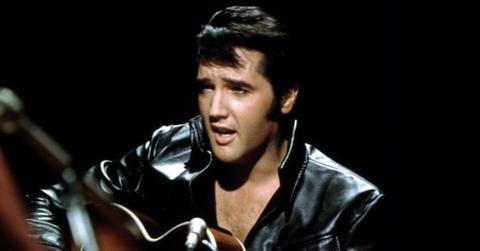 NEWS
NEWS‘Elvis Presley: The Searcher’ Uncovers The Mystery Behind The King Of Rock And Roll

April 13 2018, Updated 1:32 p.m. ET
Elvis Presley is one of the most well known musicians in American music culture, but the person who seemed to know Elvis the least was the man himself.
In HBO’s stunning new two-part documentary film, Elvis Presley: The Searcher, friends, family, fellow musicians, writers, and historians recount the timeline of Elvis’ life, from his humble upbringing in rural Mississippi during the Great Depression, to his death at Graceland in 1977.
Using home videos that show a previously unseen side of the king of rock and roll interspersed with narration from music greats like Bruce Springsteen and Tom Petty, The Searcher succeeds in showing viewers the everyday Elvis, not the larger-than-life, Las Vegas showman with the pompadour hair we so closely associate him with today.
The documentary, through studio recordings and personal interviews with Elvis’ former band mates, excels at reminding viewers that Elvis was a talented musician with a natural gift for performing. That talent, however, was exploited and stunted in the 1960s, when Elvis was forced into doing several years of kitschy songs and cheesy movies due to a strict contract with his manager Colonel Tom Parker, a contract that Elvis’ parents signed when he was still a teenager. The Colonel put Elvis on display, a product to be merchandised, stifling his artistic integrity and credibility.
To strip away that façade the Colonel so carefully constructed, the film effectively takes fans back to Elvis’ roots, when he was a young boy growing up in Mississippi who snuck into black churches so he could hear the Gospel music, or hung outside black clubs in Memphis and absorbed the culture.
“Elvis was a searcher. It’s a part of him that never left him,” Priscilla Presley, Elvis’ ex-wife, says in the documentary.
His unique combination of country music, blues, and most importantly, Gospel, made Elvis a hit on the radio, onstage, and on television alike — even if parents weren’t fans of his hip-gyrating dance moves during the conservative 1950s.
For musicians like Petty and Springsteen, Elvis left an indelible mark on their childhood and their perception of music. Elvis dared to perform black music, bringing it to the forefront of American culture just a few years before the Civil Rights Movement.
- How Elvis Presley's Manager Colonel Tom Parker Drummed Up Assassination Fears to Keep The King Trapped in America
- Lisa Marie Presley’s Twin Daughters Make Rare Appearance With Priscilla as Lawsuit Over Singer's Death Persists: Watch
- Priscilla Presley Confesses Elvis Wanted to Hire a Hit Man to Kill Her Karate Instructor After She Had an Affair
Want OK! each day? Sign up here!
“Elvis’ music pointed to black culture and said, ‘This is something that is filled with the force of life,’” Springsteen says. “If you want to be a complete and fulfilled person, if you want to be an American, this is something you need to pay attention to.”
In 1958, however, Elvis’ career was put on hold when he was drafted into the army. After serving two years in Germany — where he was first introduced to drugs as a way to stay awake, Priscilla claims —, Elvis returned home in 1960, and the Colonel reworked his image into that of a good old country boy, who did as he was told. As bands like The Beatles and The Rolling Stones, and singers like Bob Dylan, emerged with a new sound, Elvis fell behind, acting in cornball films that left him stuck in time as the music world evolved.
Luckily, a groundbreaking television special in 1968 reminded fans of his talent and launched the second half of Elvis’ career. That second half, which was an unending series of concert tours and Las Vegas residencies, proved detrimental to Elvis’ health and personal life (he and Priscilla divorced in 1973). Although he loved connecting with an audience, he was nearing the point of exhaustion. Elvis took prescribed medication to make it through the long and lonely days, weeks, months, and years, which ultimately led to his premature death at the age of 42 in 1977.
Ultimately, the film argues, it wasn’t drugs, booze, or anything salacious that did Elvis in: it was the stifling of his true self, a kid from Mississippi who loved Gospel music and connecting with his roots through song. By reminding viewers of the man behind the image, Elvis Presley: The Searcher restores Elvis to his rightful spot among American music legends.
Elvis Presley: The Searcher airs Saturday, April 14 at 8 p.m. ET on HBO.

